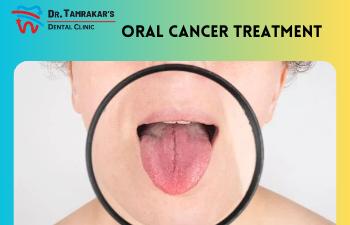The treatment of oral cancer depends on several factors, including the stage of cancer, the location and size of the tumor, and the overall health of the patient. The primary treatment options for oral cancer include: Surgery: Surgery is often the main treatment for oral cancer. It involves removing the tumor along with a margin of healthy tissue to ensure complete removal. The extent of surgery depends on the stage and location of the tumor. In some cases, a small tumor may be removed with a wide local excision, while larger tumors may require more extensive procedures like glossectomy (removal of part or all of the tongue), mandibulectomy (removal of a portion of the jawbone), or maxillectomy (removal of the upper jaw). Reconstructive surgery may also be performed to restore the appearance and function of the mouth and jaw. Radiation therapy: Radiation therapy uses high-energy beams to kill cancer cells or shrink tumors. It can be used as the primary treatment or in combination with surgery. External beam radiation therapy is the most common form of radiation treatment for oral cancer. Brachytherapy, which involves placing radioactive sources near the tumor, may be used in certain cases. Radiation therapy may be given before surgery to shrink the tumor or after surgery to kill any remaining cancer cells. Chemotherapy: Chemotherapy involves the use of drugs to kill cancer cells or stop their growth. It is often used in combination with surgery and/or radiation therapy. Chemotherapy may be administered before surgery (neoadjuvant chemotherapy) to shrink the tumor, after surgery (adjuvant chemotherapy) to kill any remaining cancer cells, or as palliative treatment to relieve symptoms in advanced cases. Targeted therapy, which uses drugs that specifically target cancer cells, may also be used in some cases. Immunotherapy: Immunotherapy is a newer treatment approach that stimulates the body's immune system to recognize and attack cancer cells. It may be used in certain cases of advanced or recurrent oral cancer. Palliative care: Palliative care focuses on providing relief from symptoms and improving the quality of life for patients with advanced oral cancer. It may involve pain management, nutritional support, and psychological support. The choice of treatment and the combination of therapies depend on the specific circumstances of each patient. A multidisciplinary team, including surgeons, radiation oncologists, medical oncologists, and other healthcare professionals, will work together to develop an individualized treatment plan based on the patient's needs and the characteristics of the cancer. Regular follow-up care is essential to monitor for any recurrence and manage any long-term effects of treatment.


